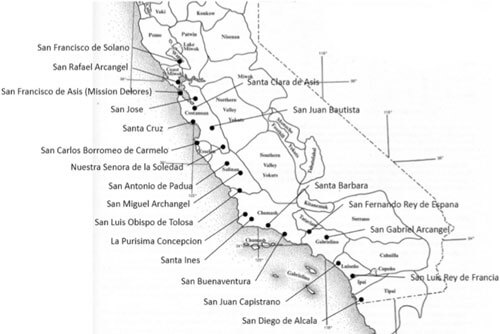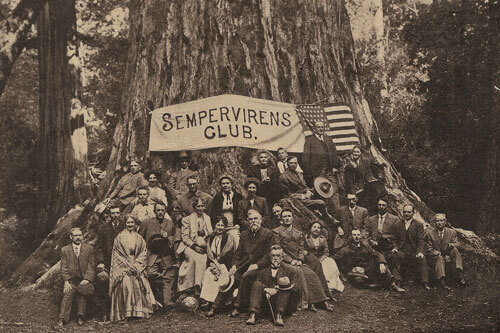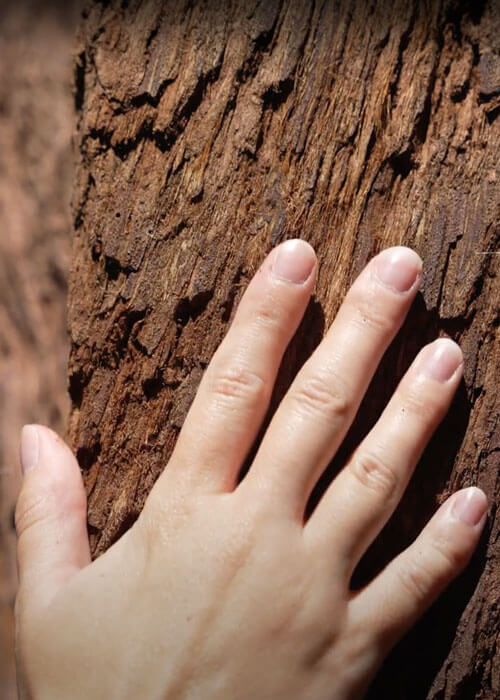photo by 7 Roots Creative.
Relearning Our Shared History
Like many organizations, we have a story. We’ve told our story countless times over the last century. It is a story of citizen advocacy, steadfast principles, pioneering spirit, and dedication to nature. The heroes in this story sought to save coast redwoods (Sequoia sempervirens) growing in the Santa Cruz mountains.
And like many organizations, we are reconciling our founding story. Canonization of our early leadership is rarely squared with the greater–and often troubling–social truths of the time.
When we were founded in 1900, most Indigenous Peoples had long been forcibly removed by colonizers from the region. California was young, growing, and voracious in the pursuit of gold, trade, and redwood lumber. Policies sustained and rewarded the barons of industry at the expense of the citizenry and the environment we all depend upon. And elite businesspeople, politicians, and academics had popularized a supremacist movement called eugenics. Through it, they subverted science to advance the idea of racially perfect (white) people through genetics and heredity.
In practice, redwoods were sturdy lumber that could resist fire and pests. For eugenicists, redwoods represented ideal, pristine, and pure wilderness. It is at this intersection that Sempervirens Club was formed, to protect an ideal species from clear cutting. Our mission to protect and care for redwoods has evolved as we have learned the complexity of their dominance. A rich and vital regional ecosystem supports redwoods, both of which we vow not only to protect, but to restore.

Map of California missions and Native American tribal territories by Joe McBride, Rita Cavero, Anna Cheshire, María Calvo, Deborah McBride, DOI: 10.1186/s13002-020-00388-y

Any standing we have today as California’s first land trust is rooted in the privilege of a free, empowered, and largely white citizenry. They were able to generate funds and benefactors. They pursued policies and plans to establish California’s oldest state park, Big Basin Redwoods, setting forth a movement. We celebrate the bold and forthright convictions of our founders to preserve redwoods. We also mourn the unjust circumstances in which they succeeded.
We are reconciling our past with the future we most want, for redwoods, for communities, and for our organization. We invite you to learn more. Below, read the philosophy that will guide our commitments for as long as we, and we hope, you, protect and care for redwoods for generations to come.
We Believe
We believe that redwoods and their interconnected ecosystems should be accessible to all people. We acknowledge exclusive, unequal, and unjust systems today are rooted in historical and systemic inequities, including the forcible removal of Indigenous Peoples from the lands we protect, the historic, systemic exclusion of Black communities from land ownership, and Asian discrimination and forced labor. We understand our privilege in this work and make intentional use of it to amplify voices that have historically been silenced and to support organizations seeking to realize new models for inclusivity, equity, and justice.
The redwood forests in the Santa Cruz mountains are among the unceded ancestral lands of the Awaswas-speaking Indigenous Peoples. As California’s first land trust, our many decades of conservation are built on the belief that protecting redwoods for people is essential, and it was the displacement of Indigenous Peoples which created conditions that both exploited and required defense of the land. We support and work with the Amah Mutsun Tribal Band and Muwekma Ohlone Tribe, who, in their obligations to the creator, are reclaiming their cultural practices to care for the Earth in traditional ways once more.
We envision a day when public spaces feel welcoming and safe for everyone. To protect the redwoods for future generations, we focus our work on the humanity of our community. We actively address the historical injustices in our roots through purposeful outreach, listening, learning, and teaching. We take steps to protect important natural resources and establish new approaches with partners to enrich access and inclusivity in nature.
To manifest our vision, we feature diversity, inclusion, equity, and justice in our work. We align our actions to our commitments by reimagining power structures and ensuring that our leadership is diverse and reflective of the communities we serve. We hire and cultivate people with deep commitments to equity, justice, and conservation, and we engage the communities most impacted by our decisions in the decision-making process.

photo by Jordan Plotsky
Our Focus
At Sempervirens Fund we are sharing in learning, skill-building, and listening, to be a more equitable workplace, to supportively invite greater diversity into our team, deepen our connections to our community, and feature equitable outcomes in our mission work. Below, please learn about our four core focus areas. We will be sharing our progress frequently and invite your ideas and feedback.
Equity Together
We are taking steps to center equity across our organization’s systems, policies, and ways of working together. These advancements will foster a greater appreciation of each of our truest identities, as people, professionals, advocates, and members of our community.
Our Culture
We are on a learning journey together. Ongoing staff training and workshops will deepen our understanding of how we can support each other and to unearth new ways in which we can work with and for each other and our mission.
Our People
We are establishing new staff recruitment, hiring, and onboarding experiences and board recruitment strategies to better reflect our mission and equity goals. As we strive for more equitable systems and strengthen our culture, we hope to be a more welcoming and inclusive place for diverse professionals and community members to work with us and to serve with our board.
Mission and Community and Forests
We are applying our Diversity, Inclusion, Equity, and Justice Philosophy and Commitment to our land conservation and stewardship practices, strengthening the capacity and opportunities for partner organizations to join and better benefit from our work, and establishing new understandings of the role our organization can play in supporting the goals of partners.
Learn More
- Read more about our work to protect Nature for All
- Read more about the impacts of the forced removal of Indigenous Peoples and California’s colonization on forests and fires in The Past, Present, and Future of Fire and Stewardship
- Read about how fungi’s ties with redwoods help break detrimental ties to eugenics in Underground Allies: The Importance of Fungi in Redwood Conservation
- Check out our DEIJ Reading List for some of our favorite books on our DEIJ journeys.

